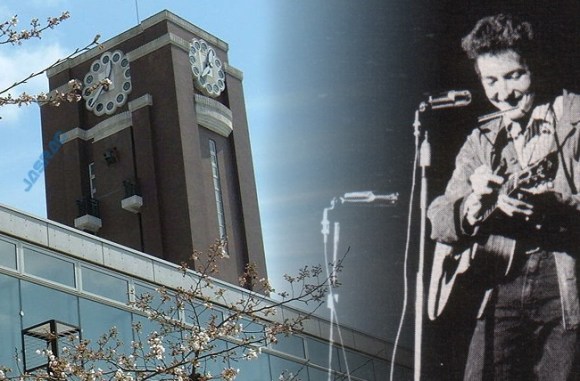
Japan’s copyright enforcers ask: how many words must a man write down, before he can be shaken down?
During a commencement ceremony for students of Kyoto University, president Juichi Yamagiwa delivered a speech that dealt with the song “Blown’ in the Wind” by folk artist and Nobel laureate Bob Dylan.
The speech was an astute interpretation of the song which he used to inspire the new students to not look for solutions in what is told to them but to free their minds and find that the, um… solution is… er, floating among differences in atmospheric pressure.
Sorry, I have to watch my words, because shortly after the speech, a notice was published by the Japanese Society of Rights of Authors, Composers and Publishers (JASRAC) who oversee the rights to Dylan’s catalog in Japan, requesting money because of Yamagiwa’s use of Dylan’s words in his speech.
It wasn’t the speech itself, but the act of Kyoto University posting it on their website that caught the eye of someone at JASRAC. No specific figure was disclosed, but reports say it could amount to tens of yen per page view.
In the transcription of the speech the following eight lines were written in both Japanese and English. Of course to avoid the same fate as Kyoto University I will have to paraphrase:
Give me the number of streets a dude’s got to strut along
Prior to saying he’s a guy?
What number of hearing organs does a single O.G. need
Ahead of him auscultating his peeps weep?
Give me the figures on the number of buckets that need to be kicked until he gets it
That a whole butt-load of dudes bit the big one?
These responses, my compatriot, are being pushed by the forces of gases flowing through the air
These responses are being pushed by the forces of gases flowing through the air
The number of revolutions a male’s noggin is able to make is what,
And make believe that my man simply ain’t getting it?
[Bob Dylan, Blowin’ in the Wind]
It certainly is easy to see how he won the Nobel with piercing lyrics such as those. However, the question remains whether Kyoto University is liable for posting them online. Kyoto Shimbun contacted the Agency for Cultural Affairs who said that if the use of lyrics can be seen as a quotation used in a context then it would not have to pay.
Of course the line between quoting and copying can be blurry, so Kyoto Shimbun also consulted a lawyer who believed that the speech falls under the classification of a quote since the words were isolated from the speech to distinguish them from Yamagiwa’s own words and the song is also cited at the end.
Neither Kyoto University nor JASRAC have made any specific comments regarding the case as of this writing, but it doesn’t look like the copyright organization has much of a leg to stand on.
Meanwhile, one has to wonder what Bob Dylan himself would think of this. As a leading figure of the counterculture of the 60s, would he give his blessing to educational institutions getting threatened to pay money to industry groups in his name?
To find out we sent our own Japanese language reporter Seiji Nakazawa on the trail of the somewhat reclusive genius. However, we didn’t give him any resources to work with so he was forced to resort to Twitter.
Since the 75-year-old musician doesn’t appear to use his Twitter account at all, we won’t be holding our breath, but Seiji still gets an A for effort.
While we’re waiting for the outcome of this controversy, I can’t help but be reminded of a line from one of Dylan’s most famous songs:
Once [REDACTED] so [REDACTED]
[REDACTED] in [REDACTED], didn’t [REDACTED]?
People [REDACTED], you’re [REDACTED]
[REDACTED] were [REDACTED]
Kind of makes you think doesn’t it? And if the JASRAC isn’t careful, the same thing might happen to them. Do they really want to be like the people shutting down kids’ copyright-infringing Pokémon parties?
Source: Kyoto University, Kyoto Shimbun, Itai News
Top image: Wikipedia/Katsura Roen, Wikipedia/Unknown, Wikipedia/JASRAC (edited by SoraNews24)